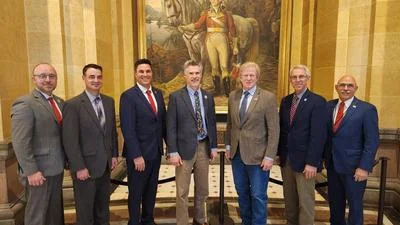Jim Kaitschuk, executive director of the Illinois Sheriff's Association | Provided
Jim Kaitschuk, executive director of the Illinois Sheriff's Association | Provided
Below is a summary of House Bill 163, Amendment 2, provided by Jim Kaitschuk, executive director of the Illinois Sheriff's Association. Jim Kaitschuk and others who oppose the bill maintain that it will strip law enforcement of many important protections and standards:
Late on January 5th, the Illinois General Assembly filed a 611 page bill that eliminates law enforcement as we know it from every community in the State. The Illinois G.A. has until noon on January 13th to pass legislation before the next duly elected General Assembly takes office. Senate Amendment number two to House Bill 163 radically changes law enforcement, victim services, criminal proceedings and the protections of every law enforcement officer in the State, regardless of employment as a peace officer, deputy, trooper, university police officer, corrections officer, court security officer or other law enforcement.
Through 611 pages, HB 163 eliminates all protections from law enforcement officers. It eliminates officer’s ability to pursue their job without civil liability, it eliminates the ability of officers to pursue collective bargaining agreements, it invalidates the constitutionally protected due process of officers and it substantially increases the costs for employers of law enforcement officers. This list is probably not comprehensive, but it certainly covers the bulk. Specifically, SB 163 does the following:
- Requires In custody death reporting to AG
- Requires statewide use of force policy
- Eliminates prison gerrymandering
- Eliminates Qualified Immunity for police officers, making them civilly liable to siren chasing trial lawyers
- Eliminates Officer’s rights to Collectively Bargain, creating a “special class” of public employee who does not have these rights in Illinois
- Eliminates impartial arbitration over burdensome residency requirements
- Allows for unrestricted and ungoverned disciplinary policies of law enforcement officers
- Prohibits departments from taking advantage of cost saving federal surplus programs or allowing the purchase of certain “militaristic” equipment
- Allows officers to be punished or fired based on anonymous and unsubstantiated or unverifiable complaints-no sworn affidavits
- Creates a co-responder model for social workers with corresponding grant funding from ICJIA
- Mandates that those unsubstantiated and unverified complaints be kept to be used against officers forever, with no destruction and no limits on how they can be utilized to inflict harm on officers
- Substantially increases both initial and ongoing education requirements with no money to pay for the increased costs and no assurances that the courses will even be offered
- Mandates the use of body cameras by all departments for every officer with no money to pay for the cost of those cameras and 20 cut in LGDF funding if you don’t
- Significantly increases the training requirements for those going through the academy and those that are already certified-provides NO money to do this
- Defunds any department that does not comply 100% with the draconian requirements of the legislation
- Eliminates funding for law enforcement agencies
- Requires reporting to National use of force registry
- No more suspending driver’s license for traffic violations
- COMPLETE ban on chokeholds and anything above the shoulders regardless of threat of serious bodily injury or death
- Eliminates Cash Bail
- Enacts multiple benefits for felons-including access to victims compensation
- Prohibits use of force in almost all situations, and makes officers criminally liable for virtually any use of force
- Removes prohibitions against obstructing police officers
- Requires duty to intervene
- Eliminates felony murder
- Institutes 3 phone call bill
- Changes parameters for getting a warrant and requires a plan for certain situations
- No custodial arrests for Category b or c offenses-citation only
- Changes standard for conditions that have to be met to not allow for pretrial release
- Eliminates charges for habitual criminals
- Charges officers with Official Misconduct, a class 3 felony, for banal and incidental issues
- Last, but not least…….EFFECTIVE IMMEDIATELY
- Find your local elected officials by going to the Illinois State Board of Elections. You can get there with this link:
If you live somewhere other than you work, please consider contacting the elected officials for both locations. You can use your work address on the State Board of Election’s website just like a home address. You can always say “I work in Springfield…” or “I live in Decatur…”
- Go to www.ILGA.gov to find the contact information for your legislators. Click the “Members” text under the House or the Senate columns to pull up the list and then just click on your legislator’s name. It will list the various contact details for your legislator and you can pick how you want to contact them. You can email them, or call their district office or their Springfield office. Choose whatever one you want, they all work. If you decide to call, you may have to leave a message on a machine or with staff. Do not worry, and it is not important that the legislator call you back. Just be sure to leave in your message that you need them to vote no on HB 163 or bills that eliminate law enforcement from their (and your) community. Do not be stressed about it, it is very easy to do.
- Some advice on being the most effective advocate you can be includes: Be respectful of their time, long calls and long messages are not necessary. Remember, these individuals work for you, so the most important thing is to let them know how they can do the best job for you.
-
- Be professional. Do not assume they are against you or supportive of the bill. Let them know what you think and what you want, but do not blame them or accuse them.
- If they disagree with you there is probably nothing you can do to change their mind. That is ok, but please remember how they handled your concerns when it is time to re-up their employment contract.
- If they do not respond to you, do not feel ignored. They are getting hundreds of calls and emails. They will read every email and listen to every message. Your voice is being heard.
- Feel free to include personal or local information. We all care about our community the most, and that is true of legislators. Feel free to share how this would hurt you, your family and your community. Be a neighbor first, a law enforcement officer second and a willing partner third.
- Thank you for being part of the effort to save law enforcement and making democracy work in the process. Feel free to let me know if you have problems, great results or questions Also, thank you to our partners at the FOP for drafting the vast majority of this piece and sharing it.






 Alerts Sign-up
Alerts Sign-up